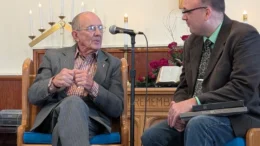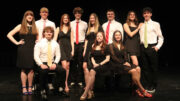The strength to forgive can conquer the greatest of hardships in director Timur Bekmambetov’s “Ben-Hur,” a remake that can’t overcome a lack of interesting characters. Although the filmmakers have attempted to readapt the original 1880 novel, they have managed to create a film that feels bland and uninspired.
Jerusalem, 2,000 years ago. Judah Ben-Hur (Jack Huston) is the young prince of a wealthy Jewish family, raised alongside his Roman stepbrother, Messala Severus (Toby Kebbell). But when Messala becomes an officer in the Roman army and falsely accuses his stepbrother of treason, Judah is separated from his family, and imprisoned as a galley slave. After years at sea, and with the help of Nubian Sheik Ilderim (Morgan Freeman), Judah challenges Messala to a chariot race, to finally enact revenge against the man who destroyed his life.
Audiences hear the word “remake” and are often left to bemoan a Hollywood that has seemingly run out of ideas. However, some remakes, such as 1983’s “Scarface,” John Carpenter’s “The Thing,” or the Cohen Brothers’ “True Grit,” are of equal status or arguably superior to their original incarnations. The same can be claimed of the 1959 version of “Ben-Hur,” a remake of the 1925 silent version, which was also a remake of a 15-minute version from 1907. It is possible for a remake to be the most iconic form of a specific story, so long as it has interesting characters and an engaging story.
And it is here, specifically, that the 2016 version of “Ben-Hur” falters and ultimately crashes like a wayward chariot. It’s almost as if everyone – the writers, the director, even the actors – was so preoccupied with the film’s legacy, that they forgot to utilize the heartfelt characterizations on which the story depends. From early on, the characters are bland and utterly uninteresting, a rather devastating blow for the scale the filmmakers were hoping to achieve.
Instead of drawing in the audience with engaging performances, most of the characters feel like they are simply reading or reciting their lines. Even talented actors like Kebbell and Freeman seem rather restricted; their characters create the impression that they don’t want to be there, as if they are in a hurry to say their lines only to keep the film moving. The presentations end up feeling stale and flat, robbing the film of much needed emotion, leaving audience interest in the hands of the scenery and action sequences.
At least these action scenes are easy to watch – their mindless tone matches the portrayal of the characters. The action tends to feature decent cinematography, only broken by the occasional bit of choppy editing, with enough flashy visuals to hold even a meager interest. This all builds up to the climactic chariot race for which the previous “Ben-Hur” was so renowned. In a way it is fitting: one of the best-known scenes is the sole source of cinematic excitement in this remake.
The 2016 version of “Ben-Hur” from director Timur Bekmambetov resides firmly in the shadow of its predecessors, lacking the emotion and characterization desperately needed to stand on its own. While the film does have nice visuals and some exciting action scenes, especially the final chariot race, the rather emotionless performances betray the scale and scope of its epic.
My grade: 5 out of 10 stars.
(Timothy Hogg has a minor in film and media studies from Slippery Rock University. Readers may contact him by email at timothyhogg.thederrick@gmail.com.)











































